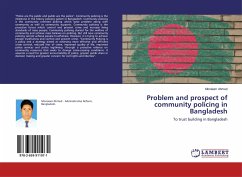Kathleen O'Toole, Robert Peirce
Seven Ways to Fix Policing NOW
Building Trust, Authentic Partnerships, and Safe Communities
Kathleen O'Toole, Robert Peirce
Seven Ways to Fix Policing NOW
Building Trust, Authentic Partnerships, and Safe Communities
- Broschiertes Buch
- Merkliste
- Auf die Merkliste
- Bewerten Bewerten
- Teilen
- Produkt teilen
- Produkterinnerung
- Produkterinnerung
The time has come to take a comprehensive look at every aspect of policing. This book does that and offers seven critical steps towards successful and sustainable police reform.
Andere Kunden interessierten sich auch für
![Seven Ways to Fix Policing NOW Seven Ways to Fix Policing NOW]() Kathleen O'TooleSeven Ways to Fix Policing NOW102,99 €
Kathleen O'TooleSeven Ways to Fix Policing NOW102,99 €![Comparative Policing Comparative Policing]() Jacques de MaillardComparative Policing179,99 €
Jacques de MaillardComparative Policing179,99 €![Policing and Race in America Policing and Race in America]() Policing and Race in America134,99 €
Policing and Race in America134,99 €![Policing Criminality and Insurgency in Africa Policing Criminality and Insurgency in Africa]() Policing Criminality and Insurgency in Africa147,99 €
Policing Criminality and Insurgency in Africa147,99 €![Problem and prospect of community policing in Bangladesh Problem and prospect of community policing in Bangladesh]() Monaiam AhmedProblem and prospect of community policing in Bangladesh26,99 €
Monaiam AhmedProblem and prospect of community policing in Bangladesh26,99 €![An End to the War on Terrorism An End to the War on Terrorism]() Phil GurskiAn End to the War on Terrorism156,99 €
Phil GurskiAn End to the War on Terrorism156,99 €![An End to the War on Terrorism An End to the War on Terrorism]() Phil GurskiAn End to the War on Terrorism60,99 €
Phil GurskiAn End to the War on Terrorism60,99 €-
-
-
The time has come to take a comprehensive look at every aspect of policing. This book does that and offers seven critical steps towards successful and sustainable police reform.
Hinweis: Dieser Artikel kann nur an eine deutsche Lieferadresse ausgeliefert werden.
Hinweis: Dieser Artikel kann nur an eine deutsche Lieferadresse ausgeliefert werden.
Produktdetails
- Produktdetails
- Verlag: Rowman & Littlefield Publishers
- Seitenzahl: 148
- Erscheinungstermin: 30. August 2022
- Englisch
- Abmessung: 216mm x 140mm x 8mm
- Gewicht: 196g
- ISBN-13: 9781538168721
- ISBN-10: 1538168723
- Artikelnr.: 63431708
- Herstellerkennzeichnung
- Libri GmbH
- Europaallee 1
- 36244 Bad Hersfeld
- gpsr@libri.de
- Verlag: Rowman & Littlefield Publishers
- Seitenzahl: 148
- Erscheinungstermin: 30. August 2022
- Englisch
- Abmessung: 216mm x 140mm x 8mm
- Gewicht: 196g
- ISBN-13: 9781538168721
- ISBN-10: 1538168723
- Artikelnr.: 63431708
- Herstellerkennzeichnung
- Libri GmbH
- Europaallee 1
- 36244 Bad Hersfeld
- gpsr@libri.de
Kathleen O'Toole is a career police officer, lawyer, and PhD. She rose through the ranks and served as Massachusetts Secretary of Public Safety, Boston Police Commissioner, Chief Inspector of Ireland's national police, and Seattle Police Chief. Robert Peirce is an international policing consultant and former diplomat and secretary for external relations in the Hong Kong government. Both worked on policing reform commissions in Northern Ireland (1998-9) and the Republic of Ireland (2017-18)
Introduction
A Crisis is an Opportunity
Seven Fundamental Questions
All Policing is Local
A Pathway to Community-based Policing Reform
Chapter One: How to Reform Policing in Divided Societies
Race in Policing
Why Northern Ireland?
'Community Policing' Belfast Style in the Mid-1990's
The Independent Commission on Policing in Northern Ireland
Commission on the Future of Policing in Ireland
How to Reform Policing
Chapter Two: Four Decades of Policing in the United States
'Crime Fighters' - Us versus Them
1990's Massachusetts - Steps in the Right Direction
Multi-agency Initiatives
More to be Done
Chapter Three: How to Define Policing
Crime and the Community
'Community Policing'
Policing as Community Safety
Policing as a Service
Policing and Human Rights
Chapter Four: How to Recruit Police
Girls Don't Become Cops
How to Recruit Diversity
Why Join the Police?
The Workforce Crisis in Policing
Smarter Recruiting
Recruitment and Retention
Chapter Five: How to Train and Educate Police
The Academy Then
Academies Now
Beyond the Academy: Training in the Community
Recruit Probation
In-Service Training
Use of Force and De-escalation Training
Less Lethal Force
The Importance of Respect
Integrated Scenario Training
Continuing Professional Development
Chapter Six: How to Organize a Policing Service
The Primacy of Patrol
Small Police Departments
Disband? Compton and Camdem
Merging Police Departments
Hierarchies and Delegation
Integrating Sworn and Non-sworn Police Personnel
Chapter Seven: How to Achieve Multi-Agency Cooperation
The Criminal Justice System
Social Services
Multi-Agency Information Sharing: A Boston Example
Chapter Eight: How to Police the Police
Consent and Accountability
Democratic Accountability
Transparency
Performance, Discipline, and Complaints
A Tripartite Model of External Oversight
Chapter Nine: How to Lead a Policing Service
Who Should be Chief?
The Command Team?
A Police Board?
Openness to Advice
Chapter Ten: Time to Act
A Crisis is an Opportunity
Seven Fundamental Questions
All Policing is Local
A Pathway to Community-based Policing Reform
Chapter One: How to Reform Policing in Divided Societies
Race in Policing
Why Northern Ireland?
'Community Policing' Belfast Style in the Mid-1990's
The Independent Commission on Policing in Northern Ireland
Commission on the Future of Policing in Ireland
How to Reform Policing
Chapter Two: Four Decades of Policing in the United States
'Crime Fighters' - Us versus Them
1990's Massachusetts - Steps in the Right Direction
Multi-agency Initiatives
More to be Done
Chapter Three: How to Define Policing
Crime and the Community
'Community Policing'
Policing as Community Safety
Policing as a Service
Policing and Human Rights
Chapter Four: How to Recruit Police
Girls Don't Become Cops
How to Recruit Diversity
Why Join the Police?
The Workforce Crisis in Policing
Smarter Recruiting
Recruitment and Retention
Chapter Five: How to Train and Educate Police
The Academy Then
Academies Now
Beyond the Academy: Training in the Community
Recruit Probation
In-Service Training
Use of Force and De-escalation Training
Less Lethal Force
The Importance of Respect
Integrated Scenario Training
Continuing Professional Development
Chapter Six: How to Organize a Policing Service
The Primacy of Patrol
Small Police Departments
Disband? Compton and Camdem
Merging Police Departments
Hierarchies and Delegation
Integrating Sworn and Non-sworn Police Personnel
Chapter Seven: How to Achieve Multi-Agency Cooperation
The Criminal Justice System
Social Services
Multi-Agency Information Sharing: A Boston Example
Chapter Eight: How to Police the Police
Consent and Accountability
Democratic Accountability
Transparency
Performance, Discipline, and Complaints
A Tripartite Model of External Oversight
Chapter Nine: How to Lead a Policing Service
Who Should be Chief?
The Command Team?
A Police Board?
Openness to Advice
Chapter Ten: Time to Act
Introduction
A Crisis is an Opportunity
Seven Fundamental Questions
All Policing is Local
A Pathway to Community-based Policing Reform
Chapter One: How to Reform Policing in Divided Societies
Race in Policing
Why Northern Ireland?
'Community Policing' Belfast Style in the Mid-1990's
The Independent Commission on Policing in Northern Ireland
Commission on the Future of Policing in Ireland
How to Reform Policing
Chapter Two: Four Decades of Policing in the United States
'Crime Fighters' - Us versus Them
1990's Massachusetts - Steps in the Right Direction
Multi-agency Initiatives
More to be Done
Chapter Three: How to Define Policing
Crime and the Community
'Community Policing'
Policing as Community Safety
Policing as a Service
Policing and Human Rights
Chapter Four: How to Recruit Police
Girls Don't Become Cops
How to Recruit Diversity
Why Join the Police?
The Workforce Crisis in Policing
Smarter Recruiting
Recruitment and Retention
Chapter Five: How to Train and Educate Police
The Academy Then
Academies Now
Beyond the Academy: Training in the Community
Recruit Probation
In-Service Training
Use of Force and De-escalation Training
Less Lethal Force
The Importance of Respect
Integrated Scenario Training
Continuing Professional Development
Chapter Six: How to Organize a Policing Service
The Primacy of Patrol
Small Police Departments
Disband? Compton and Camdem
Merging Police Departments
Hierarchies and Delegation
Integrating Sworn and Non-sworn Police Personnel
Chapter Seven: How to Achieve Multi-Agency Cooperation
The Criminal Justice System
Social Services
Multi-Agency Information Sharing: A Boston Example
Chapter Eight: How to Police the Police
Consent and Accountability
Democratic Accountability
Transparency
Performance, Discipline, and Complaints
A Tripartite Model of External Oversight
Chapter Nine: How to Lead a Policing Service
Who Should be Chief?
The Command Team?
A Police Board?
Openness to Advice
Chapter Ten: Time to Act
A Crisis is an Opportunity
Seven Fundamental Questions
All Policing is Local
A Pathway to Community-based Policing Reform
Chapter One: How to Reform Policing in Divided Societies
Race in Policing
Why Northern Ireland?
'Community Policing' Belfast Style in the Mid-1990's
The Independent Commission on Policing in Northern Ireland
Commission on the Future of Policing in Ireland
How to Reform Policing
Chapter Two: Four Decades of Policing in the United States
'Crime Fighters' - Us versus Them
1990's Massachusetts - Steps in the Right Direction
Multi-agency Initiatives
More to be Done
Chapter Three: How to Define Policing
Crime and the Community
'Community Policing'
Policing as Community Safety
Policing as a Service
Policing and Human Rights
Chapter Four: How to Recruit Police
Girls Don't Become Cops
How to Recruit Diversity
Why Join the Police?
The Workforce Crisis in Policing
Smarter Recruiting
Recruitment and Retention
Chapter Five: How to Train and Educate Police
The Academy Then
Academies Now
Beyond the Academy: Training in the Community
Recruit Probation
In-Service Training
Use of Force and De-escalation Training
Less Lethal Force
The Importance of Respect
Integrated Scenario Training
Continuing Professional Development
Chapter Six: How to Organize a Policing Service
The Primacy of Patrol
Small Police Departments
Disband? Compton and Camdem
Merging Police Departments
Hierarchies and Delegation
Integrating Sworn and Non-sworn Police Personnel
Chapter Seven: How to Achieve Multi-Agency Cooperation
The Criminal Justice System
Social Services
Multi-Agency Information Sharing: A Boston Example
Chapter Eight: How to Police the Police
Consent and Accountability
Democratic Accountability
Transparency
Performance, Discipline, and Complaints
A Tripartite Model of External Oversight
Chapter Nine: How to Lead a Policing Service
Who Should be Chief?
The Command Team?
A Police Board?
Openness to Advice
Chapter Ten: Time to Act








